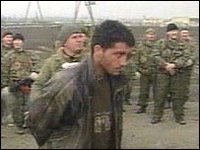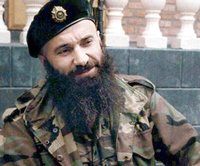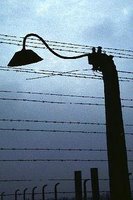 On this particular morning, October 7, Vladimir Vladimirovich woke at nine in his native city of St. Petersburg. He had had a good night's sleep, and felt relieved not to hear the bells of the Spassky tower, as he had become used to during his six years in the Kremlin. Today was his 54th birthday, and he had decided not to let the soft sound of his Swiss alarm clock wake him to the daily chores as president of Russia. All in all, it was a lovely day and he looked forward to dinner in the evening with a small set of his old friends from the Petersburg days. For once, the day was to be spent in leisure.
On this particular morning, October 7, Vladimir Vladimirovich woke at nine in his native city of St. Petersburg. He had had a good night's sleep, and felt relieved not to hear the bells of the Spassky tower, as he had become used to during his six years in the Kremlin. Today was his 54th birthday, and he had decided not to let the soft sound of his Swiss alarm clock wake him to the daily chores as president of Russia. All in all, it was a lovely day and he looked forward to dinner in the evening with a small set of his old friends from the Petersburg days. For once, the day was to be spent in leisure.For long, he had been sick with the never-ending monotony of ruling his country. Most of all, he would like to be left alone, and during the past few years he had actually succeeded in getting more free-time. Still, there were papers to be signed, people to meet, and decisions to be made. Somehow, he never seemed to rid himself of the constant responsibilities that his associates burdened him with. Not on this day, though. Today, at least, he was not to be disturbed by such petty details. After all, it was his birthday.
Today, he was to be among friends, celebrating him on his achievements of the year passed. Friends? Well, that was perhaps bringing it too far. Vladimir Vladimirovich did not believe in friendship. Connections, contacts, and acquaintances - that was another thing. They were conditions for survival - a lesson he had been taught from early childhood. His experience was that friendship and betrayal go in pairs, so he understood that "friends" were simply people he could feel comfortable and at ease with. However, he would never allow anyone to deceive or betray him. If so, he would not blink for a second before putting down anyone posing a threat to him - friend of foe alike. This was simply the nature of things in the country where he had been brought up, Vladimir Vladimirovich thought.
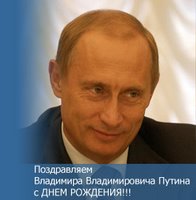
Well, such problems were at least none of his concern today. He was determined to celebrate his birthday in relative peace and quiet. Sure, there were to be some official celebrations. This was good and proper. However, some were excessive and Vladimir Vladimirovich silently jeered at upcoming Chechen celebrations. Some 60,000 people had been ordered to the Akhmat Kadyrov Square in central Grozny to sing the Russian national anthem in his honour. This was really bringing matters too far, but Vladimir Vladimirovich also saw it as an act of desperation from Chechen Premier Ramzan Kadyrov.
Kadyrov knew how much the Kremlin despised him, and this was obviously his desperate way of paying his respects to power in Moscow - the same power that could bring him down if he would go too far in his more commercial activities. Kadyrov had just turned 30, and thus was now eligible for the Chechen presidency. That he had received a brand new Ferrari for his birthday said it all. Just imagine going about in a Ferrari in the ruins and rubble of Grozny. It was only a question of time now how long president Alkhanov would still serve as a front for Kadyrov's power. Still, it was quite a convenient arrangement, letting the Chechen war lord run his murky operations in exchange for relative stability in the renegade republic. It all resembled franchising, Vladimir Vladimirovich thought to himself. Kadyrov and his stooges got to use the "Russia brand" in exchange for calm in Russia's soft under-belly.
However, Vladimir Vladimirovich actively distrusted the Kadyrov family. Already the father had meant trouble to Moscow, and some people in the Kremlin had even talked about having him shot. However, this never proved necessary as the Chechens themselves solved this problem by blowing him to pieces. Vladmir Vladimirovich expected that also the son would eventually meet with a similar fate, so he had been opposed to getting rid of the mafioso-like son. Things would settle for the best in the end, and in the meantime those terrorist Chechens might as well be ruled by a pathologically insane mafioso. It only served them right, Vladimir Vladimirovich thought.
But why think of such dull things on one's birthday? After all, it had been a rather good week. At last, he had got the excuse he needed to really pull the thumbscrews on those difficult Georgians, and he knew that his people was behind him in throwing those abominable Caucasians out of mother

Russia. Propaganda was really a marvellous thing. It is true, some protested against it. The ban on Georgian wines and mineral waters earlier in the year had not gone unnoticed, but now next to nobody reacted. Well, some of those half-crazed old soviet dissidents and intellectuals had called for demonstrations in support of Georgia and some writers had composed a rather hilarious protest letter that Vladmir Vladimirovich well knew would pass unnoticed. Who cared about those old people nowadays? Old-age pensioners in their seventies and eighties thinking that they made a difference. It was simply pathetic and of no greater consequence to power. By the way, who read those small newspapers that were still independent? He knew that 85% of the people had television as their main source of information on what was going on in the country, and as for the TV-stations, he controlled every last one of them.
Vladimir Vladimirovich spent the day doing as little as possible. How nice it was to be relieved of one's responsibilities, he thought. Then, as he turned on the four o'clock news, the breaking story was that a journalist had been killed in Moscow. Well, who was she anyway, this Anna Politkovskaya? A journalist of Novaya Gazeta - a paper with a circulation of little over 100,000 copies, sparsely distributed outside of Moscow. Still, she had been a nuisance to him abroad for the duration of his presidency, in fact ever since he initiated the second Chechen war in 1999. Who was she to meddle into the affairs of state? And besides, she was not even Russian. Typically, her parents had been Ukrainian, and as events had again demonstrated but a couple of years back, Ukrainians were not to be trusted. Anyway, the only thing this journalist had accomplished was to tarnish the image of Russia in the West - something the Kremlin had spent millions of dollars to improve just this year alone.
He realised that his long-coveted trip to Germany might be shadowed by this event, but still he was looking forward to visiting Dresden, where he had spent so many happy days of his youth. He knew that he would probably have to comment the murder somehow, but it was best to keep it to a minimum, not to be dragged into some discussion he could not control. As for the Russian public, he could simply keep quiet and let the whole affair pass by as unnoticed as possible. Something else would soon pop up, drawing the attention of domestic and international media away from the Politkovskaya murder. With a little luck, the murder might be pinned on that Kadyrov character, making him a little less cocky in relation to the Kremlin. It was best that such people never felt safe from Moscow's power to punish, Vladimir Vladimirovich thought.
His thoughts were interrupted by a soft knock on the door: Time for dinner. As he had suspected, the evening did not present any great surprises. Towards the early hours of the night, Vladimir Vladimirovich returned to his room in high spirits. A bit
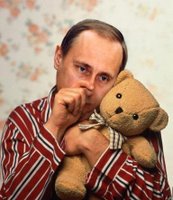
drowsy, he decided to go to bed. After all, it was a day tomorrow too. Putin fell asleep contentedly. How succesful a day had it not been. He really had not had to do anything. His birthday celebrations had been fine. Another annoying journalist was no more. Georgians were thrown out of the motherland. And best of all, that despicable Kadyrov character had been twice humiliated - by his pathetic show of faith to Putin and by having the journalist murder pinned on him. Next week, Putin was going to Germany. That would serve as a welcome pause from monotony. Another day had passed by, shadowed by nothing, an almost happy day. Three thousand four hundred and seventy two such days, from morning till evening. Those two extra days were on account of leap years... It had just been yet one day in the life of Vladimir Vladimirovich.
 For Global Voices Online: Just another death, just another obituary. That seems to be the general sentiment as news of today's murder of Russian Human Rights activist, Natalya Estemirova, broke. However, there are still people out there, in the Russian blogosphere, who challenge disillusion as yet another voice of conscience and tolerance is silenced by violent death.
For Global Voices Online: Just another death, just another obituary. That seems to be the general sentiment as news of today's murder of Russian Human Rights activist, Natalya Estemirova, broke. However, there are still people out there, in the Russian blogosphere, who challenge disillusion as yet another voice of conscience and tolerance is silenced by violent death. Natalya Estemirova was one of [Russian Human Rights Organization] Memorial's leading representative in the Caucasus. Authorities in the Republic of Chechnya never expressed any discontent with her work. Estemirova's Human Rights advocacy earnt her many international awards. She was the first recipient of the Anna Politkovskaya Award (2007), and winner of the Swedish [---] Right Livelihood Award (2004). In 2005, the European Parliament gave her the Robert Schumann medal.






